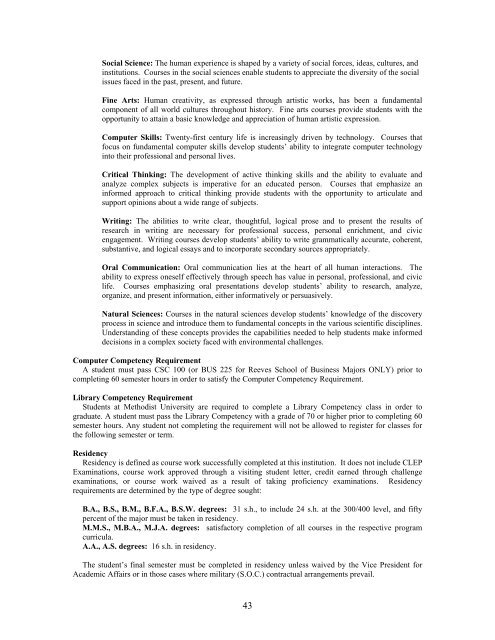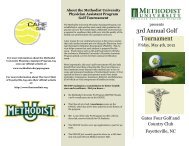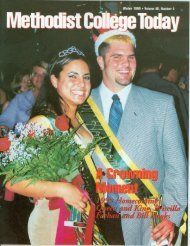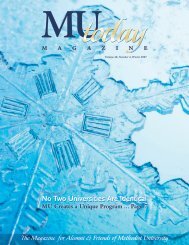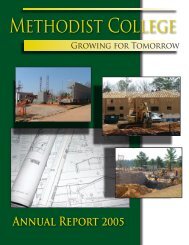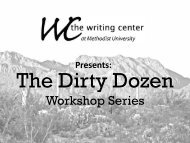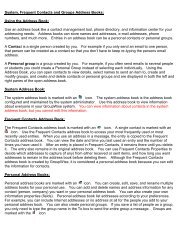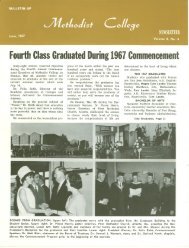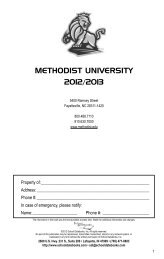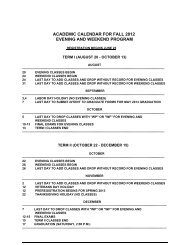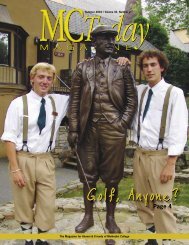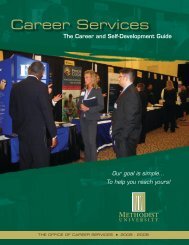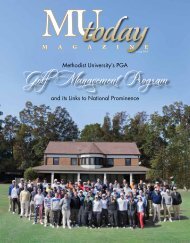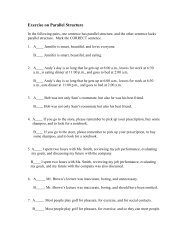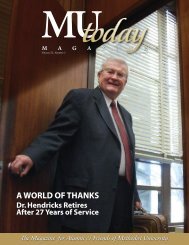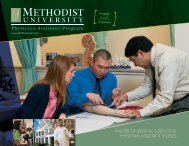Microsoft Word MU 2009-2010.doc - Methodist University
Microsoft Word MU 2009-2010.doc - Methodist University
Microsoft Word MU 2009-2010.doc - Methodist University
- No tags were found...
Create successful ePaper yourself
Turn your PDF publications into a flip-book with our unique Google optimized e-Paper software.
Social Science: The human experience is shaped by a variety of social forces, ideas, cultures, andinstitutions. Courses in the social sciences enable students to appreciate the diversity of the socialissues faced in the past, present, and future.Fine Arts: Human creativity, as expressed through artistic works, has been a fundamentalcomponent of all world cultures throughout history. Fine arts courses provide students with theopportunity to attain a basic knowledge and appreciation of human artistic expression.Computer Skills: Twenty-first century life is increasingly driven by technology. Courses thatfocus on fundamental computer skills develop students’ ability to integrate computer technologyinto their professional and personal lives.Critical Thinking: The development of active thinking skills and the ability to evaluate andanalyze complex subjects is imperative for an educated person. Courses that emphasize aninformed approach to critical thinking provide students with the opportunity to articulate andsupport opinions about a wide range of subjects.Writing: The abilities to write clear, thoughtful, logical prose and to present the results ofresearch in writing are necessary for professional success, personal enrichment, and civicengagement. Writing courses develop students’ ability to write grammatically accurate, coherent,substantive, and logical essays and to incorporate secondary sources appropriately.Oral Communication: Oral communication lies at the heart of all human interactions. Theability to express oneself effectively through speech has value in personal, professional, and civiclife. Courses emphasizing oral presentations develop students’ ability to research, analyze,organize, and present information, either informatively or persuasively.Natural Sciences: Courses in the natural sciences develop students’ knowledge of the discoveryprocess in science and introduce them to fundamental concepts in the various scientific disciplines.Understanding of these concepts provides the capabilities needed to help students make informeddecisions in a complex society faced with environmental challenges.Computer Competency RequirementA student must pass CSC 100 (or BUS 225 for Reeves School of Business Majors ONLY) prior tocompleting 60 semester hours in order to satisfy the Computer Competency Requirement.Library Competency RequirementStudents at <strong>Methodist</strong> <strong>University</strong> are required to complete a Library Competency class in order tograduate. A student must pass the Library Competency with a grade of 70 or higher prior to completing 60semester hours. Any student not completing the requirement will not be allowed to register for classes forthe following semester or term.ResidencyResidency is defined as course work successfully completed at this institution. It does not include CLEPExaminations, course work approved through a visiting student letter, credit earned through challengeexaminations, or course work waived as a result of taking proficiency examinations. Residencyrequirements are determined by the type of degree sought:B.A., B.S., B.M., B.F.A., B.S.W. degrees: 31 s.h., to include 24 s.h. at the 300/400 level, and fiftypercent of the major must be taken in residency.M.M.S., M.B.A., M.J.A. degrees: satisfactory completion of all courses in the respective programcurricula.A.A., A.S. degrees: 16 s.h. in residency.The student’s final semester must be completed in residency unless waived by the Vice President forAcademic Affairs or in those cases where military (S.O.C.) contractual arrangements prevail.43


